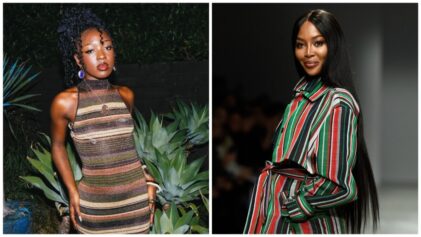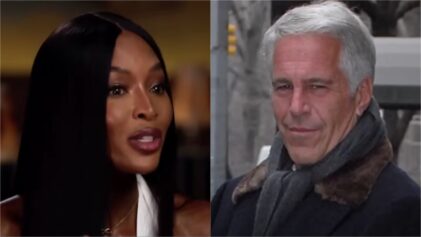In a new interview with Vogue magazine, supermodel Naomi Campbell tackled her significant modeling legacy, and how the issue of race has remained a pervasive narrative throughout her career. Her peers in the industry have labeled her an “activist,” a bold interventionist who stands up for herself and encourages others to do the same. Campbell said her response to injustices will remain unchanging.
“I never used to say the word racism; I just used to say, it’s territorialism,” Campbell said in the Oct. 19 article. “I never wanted people to say that I used that as an excuse, that I was throwing that word out. Now I’m happy that everyone’s all on the same page, that everyone feels comfortable to come out about their experiences without feeling some stigma. But for me, nothing’s changed. I’m going to speak the same way.”

Her blunt disposition has long been coverage fodder for the British press, which has not refrained from labeling her as “angry.” Vogue alludes to one interview in which the journalist appears to suggest that Campbell is somewhat responsible for not making the fashion industry more diverse. After she rebuts the idea “he questions why she is so ‘angry,’ and later even went so far as to describe her having ‘anger on a different level.’”
Campbell’s patience with the British press is tenuous, but she has gained a sense of perspective about such questioning.
“I understood exactly what angle [he] was going to come at, and that it would be combative. And I see the things newspapers go for,” she said. “I see they’d rather write some trash thing that you’ve done, rather than the good that you’ve done. When I was younger it used to upset me, but it doesn’t now—I’m not looking for those validations anymore. But I am still a little skeptical about doing interviews in England.”
When asked about navigating assumptions that her candid nature makes her an “angry Black woman” Campbell is characteristically forthright. “I am quite over it,” she says. “Is it now that we have permission to speak? Well, I have always spoken.”
She also now appears to have made the decision to speak out for all Black people, and not just for herself.
“There were a few things that I would do when I was younger that I was told were bad for my race,” Campbell says. “Now the things I do are not just for me anymore. I think more of my culture and my race, as opposed to thinking about just me.”
And though she is older, Campbell asserts that “nothing has changed,” about what she has to say or how she decides to say it. “Only that I know that I will have the support of my culture now when I speak.”
Campbell is not afraid to discuss the “racism problems” inherent in her home country, and indicated that Britain still has a lot soul-searching to do when it comes to race.
“I’d rather have racism be right in front of my face and know what I’m dealing with than to have it suppressed,” she said. “No disrespect to the country I was born in, but we need to dig it up and bring it up and deal with it. No more chucking it down the sides.”
“They haven’t learned to be not-racist, period!”
Along with advocating and action, Campbell said that in order to reconcile so much of the discrimination and prejudice that has persisted throughout history, some gesture of recompense should be made.
“I think as a generation, as a whole, can we get reparations for our culture, for what we’ve been through?” she asked.
“I absolutely believe we are going to get the positive outcome we deserve. But we have to do our work in making sure we get it. I think reparations are important for the people to really see that this is something that’s been taken seriously.”


